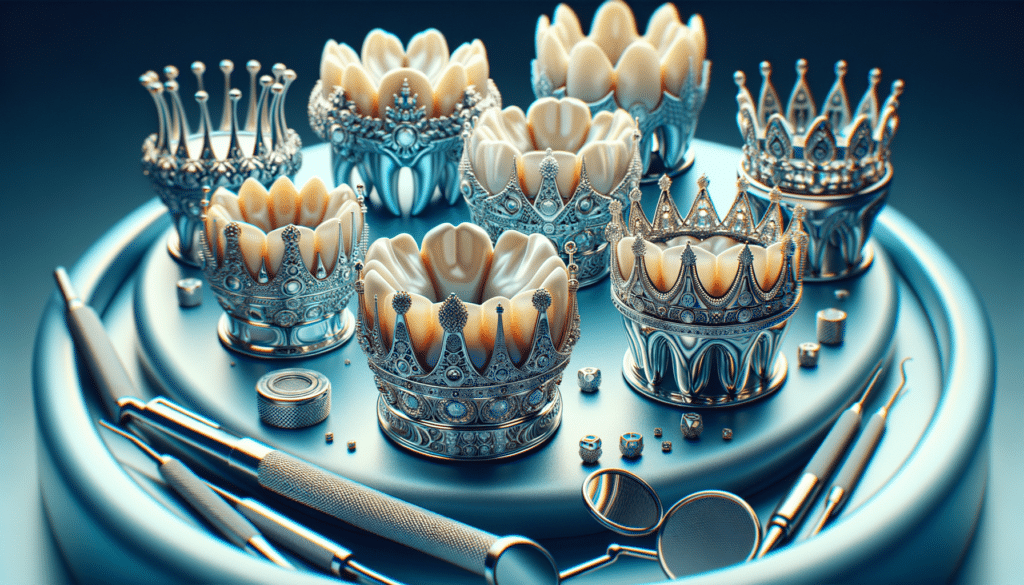Understanding Dental Crowns: A Comprehensive Overview
Dental crowns, often referred to as caps, are a common restorative dental procedure designed to cover a tooth to restore its shape, size, strength, and improve its appearance. They serve as a protective cover that encases the visible portion of the tooth above the gum line. Dental crowns are typically recommended for teeth that have been weakened by decay, cracked, or have undergone root canal treatment. They are also used to support dental bridges or cover dental implants. The importance of dental crowns lies in their ability to restore function and aesthetics to a compromised tooth, providing a long-lasting solution that can enhance one’s oral health and smile.
The Types of Dental Crowns: Materials and Their Benefits
Dental crowns come in various materials, each offering distinct advantages. Understanding these materials can help patients make informed decisions about their dental care. The most common types include:
- Porcelain Crowns: Known for their natural look, porcelain crowns are often used for front teeth. They are highly regarded for their ability to blend seamlessly with natural teeth.
- Metal Crowns: Typically made from gold or other metal alloys, these crowns are known for their durability and strength, making them ideal for molars.
- Porcelain-Fused-to-Metal (PFM) Crowns: Combining the aesthetics of porcelain and the strength of metal, PFM crowns offer a balance of beauty and durability.
- All-Resin Crowns: While more affordable, all-resin crowns are less durable and more prone to fractures compared to other types.
- Zirconia Crowns: These crowns offer exceptional strength and are resistant to wear, making them a popular choice for both anterior and posterior teeth.
Each type of crown has its unique set of benefits, and the choice often depends on the location of the tooth, the patient’s budget, and aesthetic preferences.
The Process of Getting a Dental Crown: What to Expect
The procedure of getting a dental crown typically involves two visits to the dentist. During the first visit, the dentist will examine and prepare the tooth, which may involve taking X-rays and filing down the tooth to make room for the crown. An impression of the tooth is then taken to create a custom crown, and a temporary crown is placed to protect the tooth until the permanent crown is ready.
During the second visit, the temporary crown is removed, and the permanent crown is fitted and cemented in place. Patients may experience some sensitivity or discomfort after the procedure, but this usually subsides within a few days. The entire process is designed to ensure that the crown fits perfectly and matches the adjacent teeth in color and shape.
Benefits and Considerations: Why Choose Dental Crowns?
Dental crowns offer numerous benefits, making them a popular choice for many patients. Some of the key advantages include:
- Improved Appearance: Crowns can enhance the appearance of teeth by covering discoloration and improving alignment.
- Restored Function: They restore the function of damaged teeth, allowing for normal biting and chewing.
- Durability: With proper care, dental crowns can last for many years, providing a long-term solution for dental restoration.
- Protection: Crowns protect weakened teeth from further damage or decay.
However, there are also considerations to keep in mind. Crowns can be more expensive than other restorative options, and they require the removal of a significant portion of the natural tooth structure. Additionally, crowns may need to be replaced after many years due to wear or damage.
Maintaining Your Dental Crowns: Tips for Longevity
Proper care and maintenance are essential for ensuring the longevity of dental crowns. Here are some tips to help maintain your crowns:
- Practice Good Oral Hygiene: Brush and floss regularly to prevent decay around the crowned tooth.
- Avoid Hard Foods: Chewing on hard foods or objects can damage crowns.
- Regular Dental Check-Ups: Visit your dentist regularly for check-ups and professional cleanings.
- Use a Night Guard: If you grind your teeth at night, consider using a night guard to protect your crowns.
By following these tips, patients can ensure that their dental crowns remain in excellent condition, providing lasting benefits for oral health and aesthetics.





